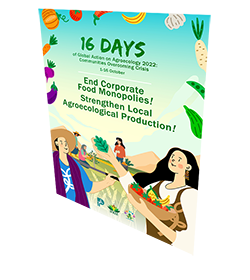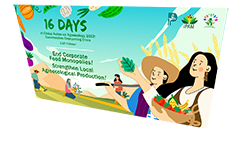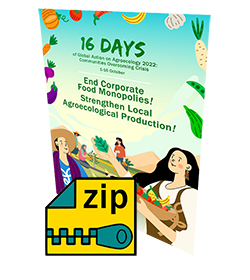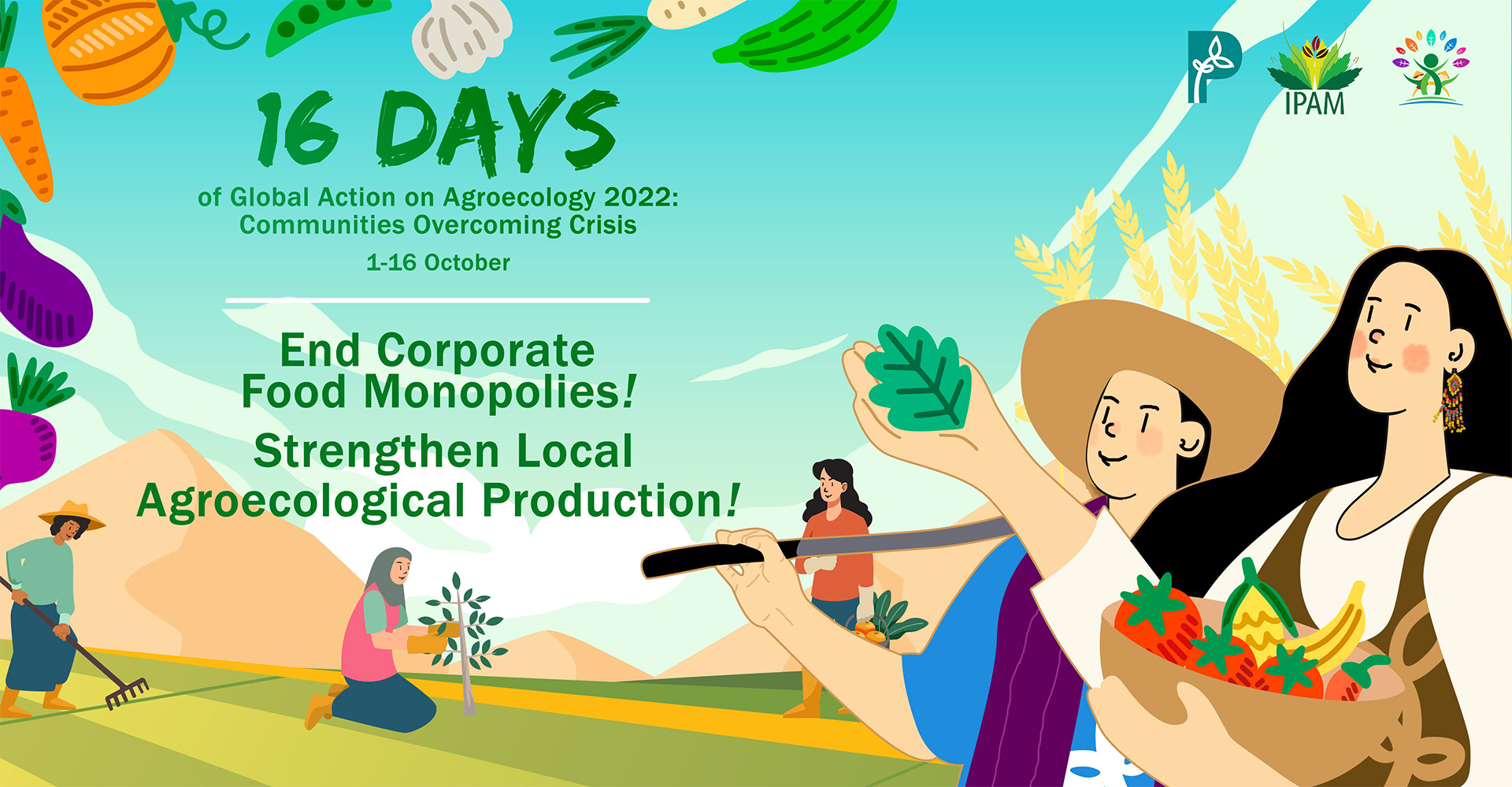Introduction
The global capitalist crisis has left people across the world grappling with increased costs of living, leading with the rise in food prices by more than 30 percent for the past two years. Once again, it is corporate monopolies in food and agriculture who benefit from this crisis, while the world’s food producers—majority of which are small, landless peasants—remain food insecure. Food price increases that leave food producers hungrier and more dispossessed than ever reveal the true nature of the crisis: not simply one of “supply chain disruptions,” but of monopoly capitalist control characterised by speculative pricing, land and resource grabs, and chemical-intensive production dictated by profit margins instead of the people’s right to affordable, healthy, and culturally-appropriate food.
The profit-oriented nature of food systems—e.g. clearing of forests for cash crop plantations, use of fossil fuel-based inputs, chemical pollution and biodiversity loss—has also contributed significantly to climate change. Yet again, it is poor rural communities who bear the brunt of the climate crisis, as seen in the recent floods that have devastated millions of hectares of farmlands in Pakistan.
Many rural communities, however, are starting to break the chains of their dependence on corporate food systems, particularly agrochemical TNCs which exercise so much control over what and how they grow. They are turning to agroecological approaches that have proven not just to be more cost-effective, but also highly productive, climate-resilient, and sustainable. Relying on diversity and local farmers’ and scientific knowledge instead of top-down “techno fixes,” agroecology has become an essential component of the people’s struggle for land and resources, food sovereignty, right to food, and the right to a clean and healthy environment. In light of the vulnerabilities of a globalized capitalist food system, strengthening local agroecological production can make communities and nations food self-sufficient.
In sum, agroecology can help communities cope with the worst impacts of the food and climate crises, especially when part of movements to transform food systems into one that is truly controlled by and for the people.
16 Days of Global Action on Agroecology
The 16 Days of Global Action on Agroecology is an annual campaign organised and participated in by PAN Asia Pacific and its partners, agroecology advocates and small food producers’ movements. Held from 1 to 16 October, the 16-day campaign is a series of community-initiated awareness-raising activities such as discussion and fora, cultural activities, seed exchanges, food festivals, farmer learning exchanges, rallies and policy advocacy, among others, aimed at promoting and advancing agroecology. It culminates on Rural Women’s Day (15 October) and World Hunger Day (16 October).
With the robust participation of peasants, women, youth, agricultural workers, fisherfolk, and indigenous peoples in previous campaigns, the 16 Days of Global Action continues to be an arena for engagement and assertion of people’s movements trying to break free from exploitative and destructive corporate food systems towards more just, equitable, healthy and sustainable food systems.
Objectives
- Highlight the impacts of food and climate crises on small food producers in the Global South, particularly how control of agrochemical TNCs over food and agriculture worsens hunger and undermines food sovereignty;
- Show how agroecology helps rural communities cope with the impacts of the food and climate crises;
- Popularise and advance the call for people-led agroecology as an alternative to chemical-intensive, corporate-controlled agriculture and as one of the Four Pillars of Food Systems Transformation;
- Demand the right to affordable, healthy, and culturally-appropriate food for all;
- Promote the youth’s initiatives and leadership role in the movement for agroecology as a one of the solutions to the food and climate crises; and
- Push for immediate and long-term food and agriculture policy changes at the local, national, regional and international levels towards achieving more just, equitable, healthy and sustainable food systems.
Our main calls and demands
End Corporate Food Monopolies!
Strengthen Local Agroecological Production!
End Climate Crisis, Agroecology Now!
Ban Highly Hazardous Pesticides!
Land to the Landless! Agroecology Now!
Fight for Just, Equitable, Healthy and Sustainable Food Systems!
Specific sectors can add their own calls and demands (e.g. Rural Women/Youth Rise Up! Advance Agroecology!) Partners can also add their own calls and demands based on the theme, including local and national-level calls and demands.
How you can join
(1) Organise an action or activity any day from October 1 to 16 in line with the objectives of the 16 Days of Global Action on Agroecology. Suggested activities are seed exchanges, food festivals, collective farming, learning exchanges, local markets, cultural activities, fora and discussion, policy advocacy, rallies, bike tours etc.
(2) Answer the question: “How has agroecology helped your community cope with the food/climate crisis?”
You can answer the question in short written or video form. Send to elnard.arellano@panap.net by September 30, 2022. (See below for short video submission guidelines) These will be published at the PANAP website & social media accounts.
(3) Print the 16 Days poster or simple placards written with our calls and demands and take a photo!
Download the materials here:
- 16 Days of Global Action on Agroecology 2022 poster (1.2 MB)
- 16 Days of Global Action on Agroecology 2022 banner (1MB)
- 16 Days of Global Action on Agroecology 2022 media kit in ZIP file (10MB) Please note that the media kit includes all PSD files which you can customise to translate them in your local language and use for your activities.



(4) Post photos or videos of your participation in the above actions and use the following hashtags: #AgroecologyNow #AgroecologyInAction
Tag us on Facebook & Twitter (@PANAsiaPacific) and Instagram (@justpesticidefreeasia)!
Stay tuned for the release of the 16 Days poster, which can be freely used, translated and disseminated by partners.
For more information on how agroecology can help transform food systems, read our CounterPoint issue entitled, Transforming Agriculture: Agroecology and the Right to Land.
______________________________________________________
Guidelines for Short Video Submission
The farmer or advocate must state his/her name and village/town/province, and answer questions: “How has agroecology helped your community cope with the food/climate crisis?”
The video can be shot using a phone and in any format, just make sure of the following:
- The video is steady (not shaky) and there is enough light
- The audio can be heard clearly
- Landscape orientation is preferred
- Maximum of 3 mins
If it is in local language, please add English subtitles on the video.
If you do not have the means to do the English subtitles, this can be done by PANAP. The organisation must provide an English translation of the short video, and PANAP will be the one who will place subtitles or dubbing. There are two ways you can provide translation:
- Written translation – Simply write down the translation and indicate the timecode (e.g. 00:10-00:20) or when it was said in the video clip.
- Spoken translation – You can send a spoken translation through an audio clip. Just make sure that the audio is roughly of the same pacing and length of the video. Please only use this option for shorter videos (up to 1 minute).
Kindly send to elnard.arellano@panap.net on or before September 30, 2022
Thank you very much for your participation!








Discussion about this post